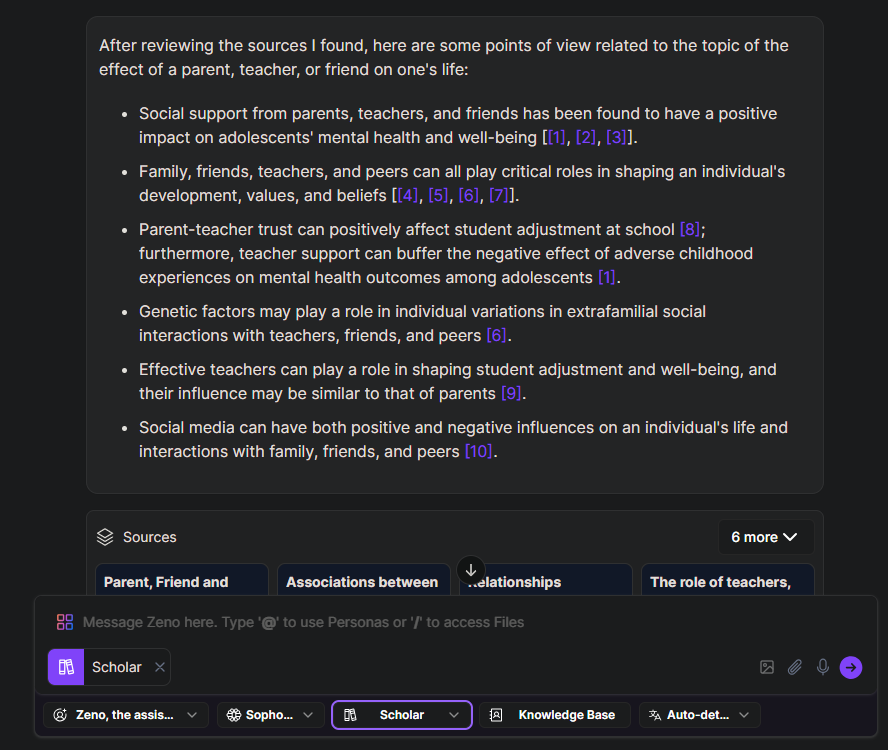The thesis is a part that highlights the purpose of writing academic papers and gives readers information about the general course of the paper. A thesis should convey the purpose and scope of the paper as well as inform readers about the topic and argument. It's important to build a strong thesis statement that suits your research topic and your entire paper.
In this article, we will explain what a thesis is and how you can build a strong one.
TL; DR
- A thesis is a few-sentence part that explains the purpose, argument, and claim of an academic paper.
- The thesis statement is usually located at the end of the introduction section of the paper.
- There are three basic thesis types: argumentative, analytical, and expository.
- To build a strong thesis statement, you need to research your topic, put together the data you have collected, analyze it, and find the gaps in the research for your thesis.
- If you are looking for an assistant to help you in your research process, ZenoChat is the way to go with its web search feature and scholar option.
- Thanks to our “Knowledge Bases” feature, ZenoChat allows you to complete your data analysis tasks in minutes and even chat with your documents.
What is a Thesis Statement?
A thesis statement is a set of sentences consisting of one to four sentences and located at the end of the introduction paragraph. It can be an argument or claim that reflects the author's point of view on the topic. Additionally, a thesis statement should provide readers with what to expect from the paper. A strong thesis statement summarizes the main argument, identifies the topic, and should encourage your audience to continue reading.
What is the Thesis Statement NOT?
When writing a thesis statement, you need to know what to avoid as well as what to do. Thus, when building your thesis statement, you can dodge possible errors and create a perfect thesis. The thesis statement is NOT a/an:
- Observation
- Statement of Fact
- Generalization
- List of Examples
3 Types of Thesis Statement
There are three types of thesis statements frequently used in academic papers. Each thesis statement type is suitable for different topics and essay types. Thesis statement types you will most frequently encounter or use in your academic career are:
- Argumentative Thesis: An argumentative thesis states the topic of your paper and your position on the topic with reasons.
- Analytical Thesis: An analytical thesis states your topic and what you analysed about your topic.
- Expository Thesis: An expository thesis states your topic and what your audience will learn in your paper.
How to Build a Strong Thesis?
When building a strong thesis, it is important to follow an outline that will guide you so that you can clearly express your topic and approach to your topic in your thesis. A thesis identifies your argument, claim, or research topic to your audience. Let's take a closer look at the key points for building a strong thesis.
Research Your Topic
When writing all parts of your academic papers, including the thesis statement, you need to research your topic and discover the counterarguments and arguments that support your argument. In this way, you can examine different perspectives about your topic and gather information. However, you should make sure that all the sources you examine are peer-reviewed articles. Wikipedia and blog posts do not have academic accuracy.
If you want to enhance your academic resource research process and streamline your workload, ZenoChat is designed for you. With its web search feature, ZenoChat can search the entire internet and provide you with articles and searches related to your topic. Additionally, with the "scholar" option of ZenoChat's web search feature, you can guarantee that it only uses academic resources when generating output.
Put All Information Together
Once you have completed the research process, you need to gather all the sources you have collected and summarize them in a few sentences. This way, you can examine all the resources you need and what they say from a broader perspective. After organizing all the data you have collected, you need to analyse it. When analysing a source you should answer questions like “How can this source contribute to my topic?” Thus, you can get one step closer to building a strong thesis about your topic.
Find Gaps on Your Topic
After gathering and analysing all the data, you will discover how different researchers approach your topic. You can then brainstorm to find perspectives or questions that researchers have not addressed in order to build a strong and original thesis. Thus, you can contribute to the literature and attract the attention of your audience with an original thesis.
Review Your Topic from Different Points of View
After collecting sufficient data about your topic and analysing it, you can re-evaluate it from different perspectives and produce different theories. An original and engaging thesis can inform your audience about what your paper will discuss or examine, while also persuading them to continue reading.

Building a strong thesis is a time-consuming and challenging process unless you know how to streamline this process. By using AI tools, you can boost both your research and writing processes and maximize your productivity.
TextCortex AI
If you are looking for an assistant who will support you throughout your entire academic paper writing process, from research to proofreading, TextCortex is the way to go. With its advanced AI features and web search capabilities, TextCortex is designed to reduce the workload of its users. TextCortex is available as both a web application and a browser extension. The TextCortex browser extension is integrated with 30,000+ websites and apps, so you can integrate it into your workload anywhere and at any time.
ZenoChat – Your Personal AI Assistant
ZenoChat is a conversational AI that analyses the prompts of its users and generates the outputs they need in a clear, concise, and human-like manner. It is possible to utilize ZenoChat as your writing or research assistant. ZenoChat can generate text from scratch, edit your existing texts, or generate output by using the whole internet as data.
ZenoChat comes with a web search feature that allows it to respond to users' queries using the latest Google data. ZenoChat’s web search feature has seven different categories: Internet, Wikipedia, Twitter, YouTube, Reddit, News, and Scholar. By selecting "scholar" among these options, you can ensure that ZenoChat generates responses using only academic resources.
Knowledge Bases
If reviewing dozens of academic sources seems like a long and difficult process, you don't need to worry. ZenoChat is here to take care of the heavy lifting! You can utilize our “Knowledge Bases” feature so that ZenoChat uses only the documents or academic resources you provide when generating output.
Thus, with a few basic prompts, you can analyse the entire academic resource via ZenoChat and complete your workload in 12x less time. Moreover, our “Knowledge Bases” feature allows you to chat with your documents or academic sources.

%20(6).png)
%20(5).png)
%20(4).png)
%20(3).png)